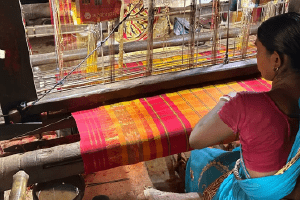India sits at the cusp of a creativity and culture-led manufacturing revolution. A significant player in this is the nation’s vast and diverse handloom sector, which offers a ready foundation to build the future of sustainable textile value chains. The sector engages close to 2.6 million weavers, one million allied workers and three million families.
The demand for handloom textiles is growing, but the industry lacks the infrastructure to support its efficient and fair growth. Accelerated digital adoption across the country presents many opportunities to bridge the gaps in information, access, and market linkages for India’s artisans, weavers, and collective enterprises.
As part of the SARDI India MSME Tech Policy Fellowship Program (an initiative by USAID & DAI and anchored by LEAD at Krea University), this research examines the present landscape of collective enterprises in India’s handloom sector and the state of digital adoption. The study draws on insights and data collected from 309 collective enterprises and 1236 weavers across four states: Assam, Tamil Nadu, Uttar Pradesh, and West Bengal. It explores how collective enterprises can act as key intermediaries in enhancing digital adoption among communities in the handloom sector and thereby aid the creation of networked ecosystems needed for inclusive and green production.

